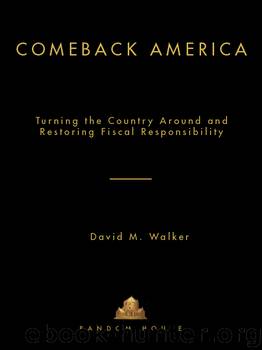Comeback America by David Walker

Author:David Walker [Walker, David M.]
Language: eng
Format: epub
ISBN: 978-1-58836-976-5
Publisher: Random House Publishing Group
Published: 2009-03-14T16:00:00+00:00
THE REFORM DEBATE
The changes I’m suggesting in this chapter fit the principles I’ve kept in mind throughout this book. They respect our values, make best use of our financial resources, and are fairer for the next generation. They also make common sense. If we want to raise tax money the American way, we have to keep the rates low and make sure we all pay our fair share.
There are, of course, many other voices in the debate. Let’s not spend much time on the voices from the fringes, such as those that argue for either a welfare state or tax-free capitalism. Keep in mind, contrary to assertions by some, not all tax cuts stimulate the economy, and very few tax cuts pay for themselves. To pay for themselves, they have to result in more gross tax revenue after the tax cut than would have been received without the tax cut.
Others have more dramatic proposals for transforming our tax system. Former House majority leader Dick Armey (R-TX) has long advocated a “flat tax.” Under this approach, the tax base would be broadened and all taxpayers would pay a single tax rate on all taxable income above a stated level. Wages would continue to be subject to Social Security and Medicare payroll taxes.
An even more dramatic tax reform approach has been advocated by Representative John Linder (R-GA) and others. Under their “fair tax” proposal, all individual and corporate income and payroll taxes would be repealed and replaced with a national consumption-based tax of about 30 percent on all purchases of goods and services. All individuals would receive a tax credit for purchases up to a stated level (for example, $10,400 for one person and $21,200 for a family of four in the continental United States). This approach would attempt to preserve the benefits of a consumption tax while avoiding its impact on our less-well-off fellow citizens. A side benefit of this approach, some assert, would be the elimination of the IRS—although some federal entity would need to manage the new system of credits. Irrespective of the intellectual merits of this system, the political feasibility is highly questionable.
The fairness of any new federal system would have to be judged by how equitably the burdens are shared by Americans rich and poor. We must also be concerned with the adequacy of our tax system. In the final analysis, it must generate enough revenues to pay our bills and deliver on the promises that the federal government intends to keep.
By now you recognize my mantra. The expansion of government over time, excessive spending, and the continuing cry for tax relief have been driving us toward bankruptcy. What we need is tax reform: a simpler, fairer, more transparent, and user-friendly system that brings sufficient revenues into our Treasury and uses them more productively—not to finance more unaffordable and unsustainable wants, but to meet essential needs for America and Americans. I have outlined some of these reforms in this chapter. These reforms not only will assist in our pursuit of happiness, they will boost America’s competitiveness in the global economy.
Download
This site does not store any files on its server. We only index and link to content provided by other sites. Please contact the content providers to delete copyright contents if any and email us, we'll remove relevant links or contents immediately.
The Secret History by Donna Tartt(16622)
The Social Justice Warrior Handbook by Lisa De Pasquale(11489)
Thirteen Reasons Why by Jay Asher(7788)
This Is How You Lose Her by Junot Diaz(5771)
Weapons of Math Destruction by Cathy O'Neil(5036)
Zero to One by Peter Thiel(4824)
The Myth of the Strong Leader by Archie Brown(4789)
Promise Me, Dad by Joe Biden(4447)
Beartown by Fredrik Backman(4417)
Stone's Rules by Roger Stone(4415)
How Democracies Die by Steven Levitsky & Daniel Ziblatt(4398)
The Fire Next Time by James Baldwin(4342)
100 Deadly Skills by Clint Emerson(4076)
A Higher Loyalty: Truth, Lies, and Leadership by James Comey(4032)
Rise and Kill First by Ronen Bergman(4012)
The David Icke Guide to the Global Conspiracy (and how to end it) by David Icke(3881)
The Farm by Tom Rob Smith(3872)
Secrecy World by Jake Bernstein(3782)
The Doomsday Machine by Daniel Ellsberg(3730)
